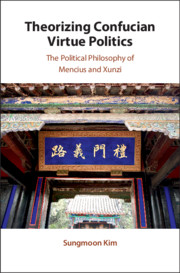Book contents
- Theorizing Confucian Virtue Politics
- Theorizing Confucian Virtue Politics
- Copyright page
- Dedication
- Contents
- Preface
- Conventions
- Introduction
- Part I Confucian Constitutionalism
- 1 Interest, Morality, and Positive Confucianism
- 2 Virtue, Ritual, and Constitutionalism
- 3 Before and after Ritual: Moral Virtue and Civic Virtue
- Part II Wang, Ba, and Interstate Relations
- Conclusion: Between Old and New
- Bibliography
- Index
3 - Before and after Ritual: Moral Virtue and Civic Virtue
from Part I - Confucian Constitutionalism
Published online by Cambridge University Press: 04 November 2019
- Theorizing Confucian Virtue Politics
- Theorizing Confucian Virtue Politics
- Copyright page
- Dedication
- Contents
- Preface
- Conventions
- Introduction
- Part I Confucian Constitutionalism
- 1 Interest, Morality, and Positive Confucianism
- 2 Virtue, Ritual, and Constitutionalism
- 3 Before and after Ritual: Moral Virtue and Civic Virtue
- Part II Wang, Ba, and Interstate Relations
- Conclusion: Between Old and New
- Bibliography
- Index
Summary
One of my core arguments in previous chapters has been that the different modes of Confucian virtue politics advanced by Mencius and Xunzi (virtue constitutionalism versus ritual constitutionalism in particular and negative Confucianism versus positive Confucianism to a lesser degree) are closely connected with the classical Confucians’ contrasting accounts of human nature and moral self-cultivation.
- Type
- Chapter
- Information
- Theorizing Confucian Virtue PoliticsThe Political Philosophy of Mencius and Xunzi, pp. 89 - 114Publisher: Cambridge University PressPrint publication year: 2019

